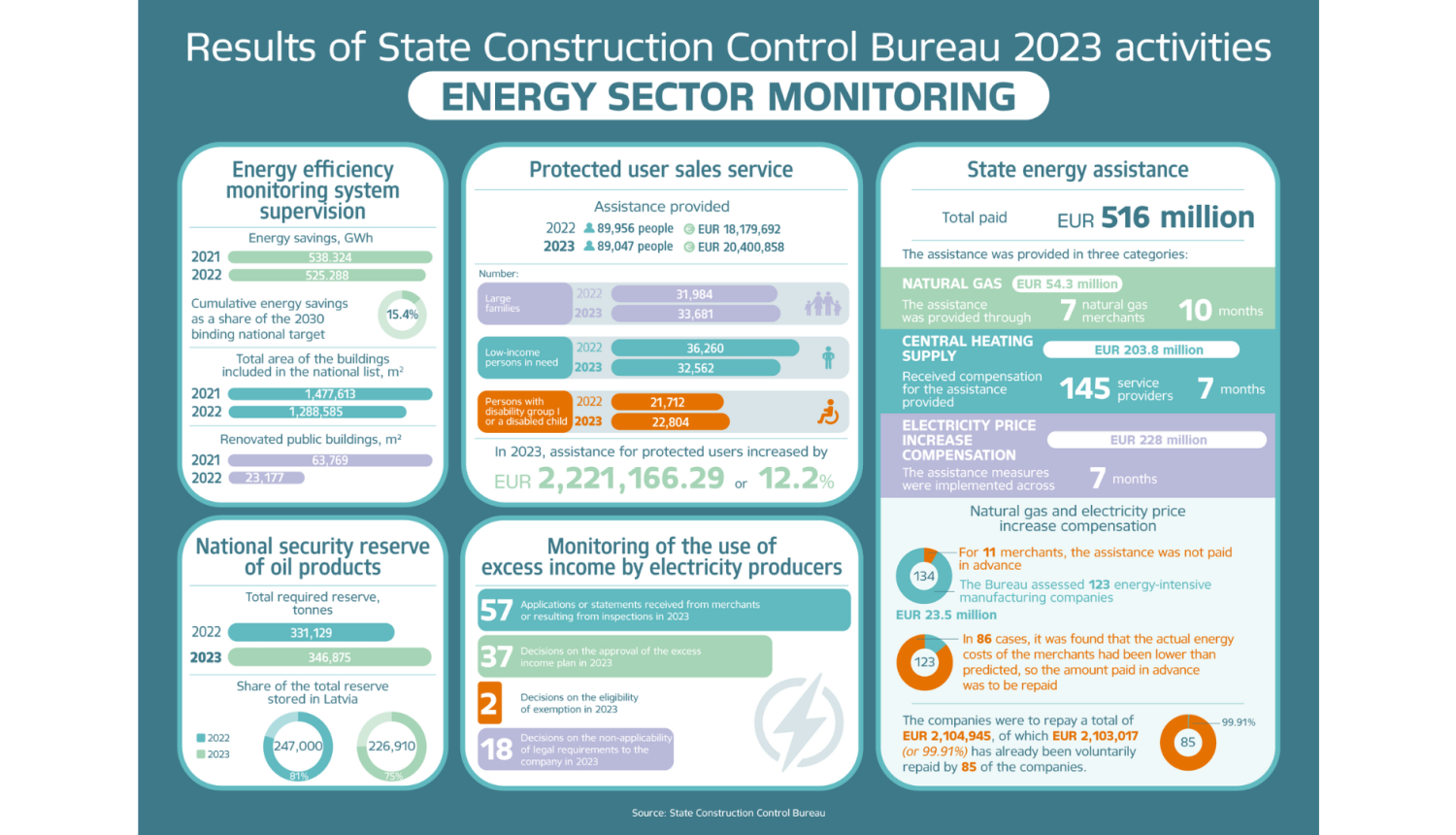Within one year of the introduction of the Energy Resource Information System (ERIS), it has seen a 73% increase in the number of annual reports on implemented energy efficiency improvement measures. ERIS has been available to its users since 2023 and offers a number of modules aimed at relieving the administrative burden, facilitating the collection of better-quality data, and enabling both the users and SCCB’s experts to analyse them.
Energy efficiency
The total new energy savings recorded in ERIS for 2022 amount to 525.288 GWh. Taking the 2021 savings into account, the cumulative energy savings for the period up to 2030 are expected to be as high as 3147.883 GWh, which is 15.4% of the binding national target for 2030.
According to the Energy Efficiency Law, national authorities and municipal governments were required to implement an energy management system (in the state cities, the system must be certified). The governments of state cities have fulfilled this duty 100%, whereas in the municipalities, the compliance rate is 47%. National government institutions have achieved 58% and other derived public entities have completed 35% of the duty.
In order to provide public administration entities with an example of efficient energy management, SCCB ran a series of information events, called Towards Smarter Governance II (‘Ceļā uz viedāku pārvaldību II’), where the Bureau discussed the process and benefits of implementing an energy management system. More than 100 participants attended the events.
Support for vulnerable households
As part of the Support for Affordable Energy project, compensation was paid to vulnerable households to reduce their centralised heating bills in the 2022/2023 heating season, by a total of EUR 60,000,000. According to the Central Statistical Bureau, vulnerable households accounted for about 58.3% of all heat users billed.
Within a remarkably short timeframe of four months in autumn 2023, the SCCB developed the Energy Cost Compensation Information System (EIKIS) whose operation involves the information system registers of a number of government institutions, as well as electricity, gas, and heating supply trading companies and distribution system operators. It was a major challenge, but given the SCCB’s experience in developing and implementing systems, the Bureau overcame it successfully. The creation of this system provides a long-awaited solution for measuring the average income of households and providing assistance in a targeted way.
Protected user sales service
Through the Protected Users Data Information System (ALDIS), protected users eligible for electric power bill reduction assistance in 2023 received a total of EUR 20.4 million. Such protected users include large families, which received EUR 8.9 million as assistance in 2023. In 2023, assistance for persons with disability group I and families with children with disabilities was granted in the total amount of EUR 4.7 million, while EUR 6.6 million went to the poor and low-income persons.
State energy assistance
The 2022/2023 heating season government assistance for centralised heating, natural gas, and electricity supply services, as well as for energy-intensive companies came to a close, with its total amount rising from EUR 465 million to EUR 516 million, because despite the end of the compensation period, invoices were still being paid for, resulting in changes in the amount of assistance paid.
National security reserve of oil products
In 2023, the national oil product security reserve had enough oil products for 86 days. 75% of the total amount of this reserve was stored in Latvia.
Starting in 2024, the model for managing the country’s oil product security reserve changes, helping Latvia strengthen its economic and energy security. On 1 January 2024, the functions of the central entity maintaining the reserve were transferred to SIA ‘Publisko aktīvu pārvaldītājs Possessor’.
Follow-up inspections of energy-intensive manufacturing companies
The Bureau assessed 123 energy-intensive manufacturing companies that received government assistance to compensate for sharp increases in energy prices. In 86 cases, the actual energy costs of these companies were found to have been lower than predicted, so the amounts paid in advance were to be repaid, for a total of EUR 2.1 million, of which 99.91% has already been voluntarily repaid by 85 of the companies.
In summer of 2023, the SCCB was assigned a new function: monitoring the use of excess income by electricity producers. During the reporting period, the SCCB has assessed information about 62 electricity producers and in 36 cases, it was found that they had earned excess income, with the SCCB adopting decisions on the approval of plans on the use of this excess income prepared by the electricity producers (for a total amount of EUR 6,337,293.02), ensuring that they invest this surplus revenue in decarbonisation technologies, renewable energy sources, and energy performance.
New SCCB functions in 2024:
- Issuing of permits for the increase, extension, and introduction of new power generation capacity;
- Collection of data on the sustainability calculations reported by merchants in ERIS. At the end of last year, a new ERIS module was developed for submitting sustainability certificates, along with a tool for calculating greenhouse gas emissions.
In 2023, the SCCB received an award as the leader in a list of 115 Latvian institutions in the Efficiency of Internal Processes category of MEPRD’s E-Index initiative. The Bureau took 3rd place in the Customer Service and Support and Open Data Accessibility categories. The SCCB won bronze in the assessment of government institutions as part of the Sustainability Index 2023 organised by the Corporate Sustainability and Responsibility Institute (InCSR).



